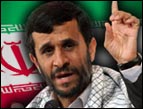Courtesy of Central Command
Leaders working toward security handover, dismantling al Qaeda in Iraq
Friday, 01 December 2006

Wearing new uniforms, members of the Iraqi National Police Quick Reaction Force in Baghdad assemble to receive instructions for their next mission. New uniforms are part of the goal to create a credible police force and gain the trust and confidence of the Iraqi people. (Photo by U.S. Army Sgt. Shannon Cranne)
BAGHDAD
— Maj. Gen. William B. Caldwell, Multi-National Force – Iraq spokesman, spoke to members of the Arab media during a round-table discussion Thursday in the wake of President Bush’s meeting with Iraqi Prime Minister Nouri al-Maliki in Amman, Jordan.
During the president’s meeting with the prime minister they agreed to “accelerate” the transfer of security responsibility from Coalition Forces to Iraqi Security Forces.
Caldwell told reporters Coalition Forces would do their best to quell violence in Iraq for as long as the Iraqi Government needed them. The transition of responsibility would occur when Iraqi leaders are ready, and not before, he said.
“Iraqi Forces need more support from Multi-National Force – Iraq,” Caldwell said. “They need more troops and equipment before Iraq can ask American and Coalition Forces to pull out of Iraq.”
Caldwell emphasized that any solution to problems in Iraq will be an “Iraqi solution,” not one dictated by Coalition Forces or the United States.
“The president is committed to help the (Iraqi) government see it through until the Iraqi prime minister says U.S. assistance is no longer needed. At that time, American troops will go home,” he said.
Responding to questions on the recent rise in violence throughout Iraq, Caldwell said the current situation is “unacceptable,” and that Coalition Forces are doing everything they can to ease the problem.
Caldwell showed the reporters photos of more than 30 terror leaders who have been killed or captured in the last few months. (Click here for the Slides)
“The more we can do to bring down these operations, the greater our ability to bring down the levels of violence,” Caldwell said.
However, he said, military force is not enough.
“There needs to be a political and military solution,” Caldwell said. “A military solution alone will not solve the problem of violence. I’m encouraged to hear that the prime minister and political parties are talking about a political solution.”
Until then, he said, Coalition Forces will keep training Iraqi Security Forces to maintain peace in the streets of Iraq and work toward the accelerated transfer of security responsibility agreed upon by the president and prime minister.
Dr. Ali al-Dabbagh, a spokesman for the Iraqi Government, joined Caldwell during his discussion with the media. Al-Dabbagh said Iraqi troops could take control of their own security operations as early as June 2007.
He said the ability of Iraqi Security Forces to deal with terrorists and insurgent militias on their own will bolster the legitimacy of Iraq’s democratically elected government.
“When Iraqi Security Forces have the ability to deal with the militias, then the Iraqi elected government will be strong,” al-Dabbagh said. “As long as militias operate in Iraq, it will be difficult for the Iraqi government to uphold the rule of law.”
“There are as many as 23 different militias operating in Baghdad alone,” Caldwell said. “The prime minister wants to deal with them within the political process. The Coalition Force’s position is that if somebody acts outside of the law – murders, executions, kidnappings – we’re going to go after them as individuals while the prime minister continues the political task of going after them as organizations.”
Al-Dabbagh said anyone who commits violence against Iraqis is a criminal and will be dealt with as such.
“No one is above the law if he breaks the law,” al-Dabbbagh said. “These militias have no right to carry weapons in the streets. The government will deal with all of them equally.”
With an accelerated timetable to make security a solely Iraqi responsibility, Caldwell said 2007 will be a “year of transition.”
Transition, he said, will begin with intensified training of Iraqi Army and Police forces.
“You’ll see a greater number of Coalition Forces that will be embedded and working beside Iraqi Army and Iraqi Police. Where before you had an 18-person team, you may now see a 54-person team. The goal is to focus on professionalism and the training of leaders.”
Caldwell said the transition will include a gradual pullback of Coalition combat operations as Iraqi troops begin to shoulder the load.
“You will see far fewer Coalition Forces doing military operations, and far more Iraqi Forces,” Caldwell said. “The Coalition Force will take on more of a support role than it ever has before. Iraqi forces will clearly be in the lead.”
Technorati tags:
coalition troops,
iraqi freedom,
iraqi troops,
baghdad,
Maj. Gen. William B. Caldwell,
Multi-National Force,
Iraqi Prime Minister,
Nouri al-Maliki,
Amman,
Jordan,
Iraqi Security Forces,
terror leaders,
terror-cell,
terrorists,
counterterrorism,
counter insurgency,
insurgent activity,
weapons,
roadside bombs,
bombers,
Iraqi Army,
Iraqi Police,
war on terror,
counter terrorism,
military raids,
military operations(Compiled by Combined Press Information Center)





 Maj. Kalil Malek Ahmad, commander, 4th Battalion, 2nd Brigade, 5th Iraqi Army, said his Soldiers identified insurgents with the help of intelligence sources.
Maj. Kalil Malek Ahmad, commander, 4th Battalion, 2nd Brigade, 5th Iraqi Army, said his Soldiers identified insurgents with the help of intelligence sources. 


 Courtesy of The Scotsman Newspaper
Courtesy of The Scotsman Newspaper








